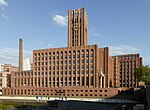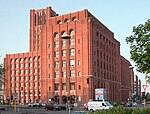Berlin Tempelhof Airport (German: Flughafen Berlin-Tempelhof) (IATA: THF, ICAO: EDDI) was one of the first airports in Berlin, Germany. Situated in the south-central Berlin borough of Tempelhof-Schöneberg, the airport ceased operating in 2008 amid controversy, leaving Tegel and Schönefeld as the two main airports serving the city until both were replaced by Berlin Brandenburg Airport in 2020.Tempelhof was designated as an airport by the Reich Ministry of Transport on 8 October 1923. The old terminal was originally constructed in 1927. In anticipation of increasing air traffic, the Nazi government began an enormous reconstruction in the mid-1930s. While it was occasionally cited as the world's oldest operating commercial airport, the title was disputed by several other airports, and is no longer an issue since its closure.
Tempelhof was one of Europe's three iconic pre-World War II airports, the others being London's now defunct Croydon Airport and the old Paris–Le Bourget Airport. It acquired a further iconic status as the centre of the Berlin Airlift of 1948–49. One of the airport's most distinctive features is its huge, canopy-style roof extending over the apron, able to accommodate most contemporary airliners in the 1950s, 1960s and early 1970s, protecting passengers from the elements. Tempelhof Airport's main building was once among the twenty largest buildings on earth, but it also formerly contained the world's smallest duty-free shop.Tempelhof Airport closed all operations on 30 October 2008, despite the efforts of some protesters to prevent the closure. A non-binding referendum was held on 27 April 2008 against the impending closure but failed due to low voter turnout. The former airfield has subsequently been used as a recreational space known as Tempelhofer Feld. In September 2015 it was announced that Tempelhof would also become an emergency refugee camp.










